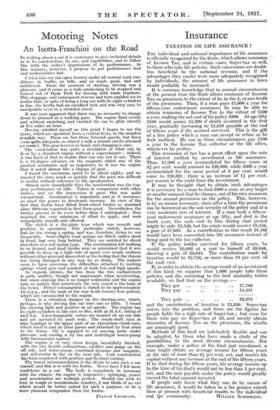Insurance
TAXATION OR LIFE ASSURANCE ?
THE individual and national importance of life assurance is officially recognized by the State, which allows remission of Income Tax, and in certain cases, Super-tax as well, to those who take life policies. Such concessions are doubt- less beneficial to the national revenue, and if the advantages they confer were more adequately recognized by individuals, the amount of life assurance in force would probably be increased. It is common knowledge that in normal circumstances at the present time the State allows remission of Income Tax on premiums to the extent of 2s. in the £, or one-tenth of the premiums. Thus, if a man pays £1,000 a year for fifteen-year endowment assurance, he may be able to obtain remission of Income Tax to the extent of £100 a year, making the net cost of his policy £900. At age fifty £100 would assure £1,390 if death occurred in the first year, gradually increasing to £1,859 payable at the end of fifteen years if the assured survived. This is the gift of a free policy which a man can accept or refuse as he feels inclined. He can in these circumstances pay 1100 a year to the Income Tax collector or the life office, whichever he prefers. This remission of tax has a great effect upon the rate of interest yielded by investment in life assurance. Thus, £1,000 a year accumulated for fifteen years at 31 per cent. would amount to £20,393, while £900 a year accumulated for the same period at 5 per cent. would come to £20,391: there is an increase of 11 per cent. per annum in the yield from the investment. It may be thought that to obtain such advantages it is necessary for a man to find £900 a year,,or -any larger or smaller amount that he chooses, out of his own resources for the annual premiums on the policy. This, however, is by no means necessary, since after a time the premiums can be borrowed on the sole security of the_policy and .at very moderate rate of interest. If a man took a fifteen- year endowment assurance at age fifty, and died in the tenth year, the cash cost to him during that period might be only £2,520, but his estate would receive £9,588, a gain of £7,068. As a contribution to this result £1,432 would have been converted into life assurance instead of being paid to the tax collector. -If the policy • holder survived for fifteen years, he would receive 16,893. at a cost to himself of £3,848, showing a gain of 13,045. The contribution made by taxation would be £2,728, or more than 70 per cent. of the cash cost.
If, in order to obtain the average result of an investment of this kind, we suppose that 1,000 people take these policies, and die, according to the best mortality tables available, we find that on the average :— They get .. .. £7,766 They pay .. £4,491 They gain .. • • .. £3,275 and the contribution of taxation is £2,350. Super-tax enters into the problem, and these are the -figures for people liable for a high rate of Super-tax ; but even for those who pay no Super-tax at all, and merely obtain remission of Income Tax on the premiums, the results are amazingly good.
Methods of this kind are indefinitely flexible and, can be adapted, by those who have made a study of the possibilities, to the most diverse circumstances. For example, under a policy of the kind just mentioned, a man might obtain an average income- for fifteen years at the rate of more than 6f per cent. net, and receive his capital without any increase at the end of the fifteen years. If he died during the fifteen years, his average income up to the time of death would hot be less than 5 per cent. net, and the sum payable under the policy would greatly exceed thOotal amount invested.- If people only knevi whit they- can do by means of life assurance, it would be taken to a far greater extent. than at present with beneficial results to the individual










































 Previous page
Previous page